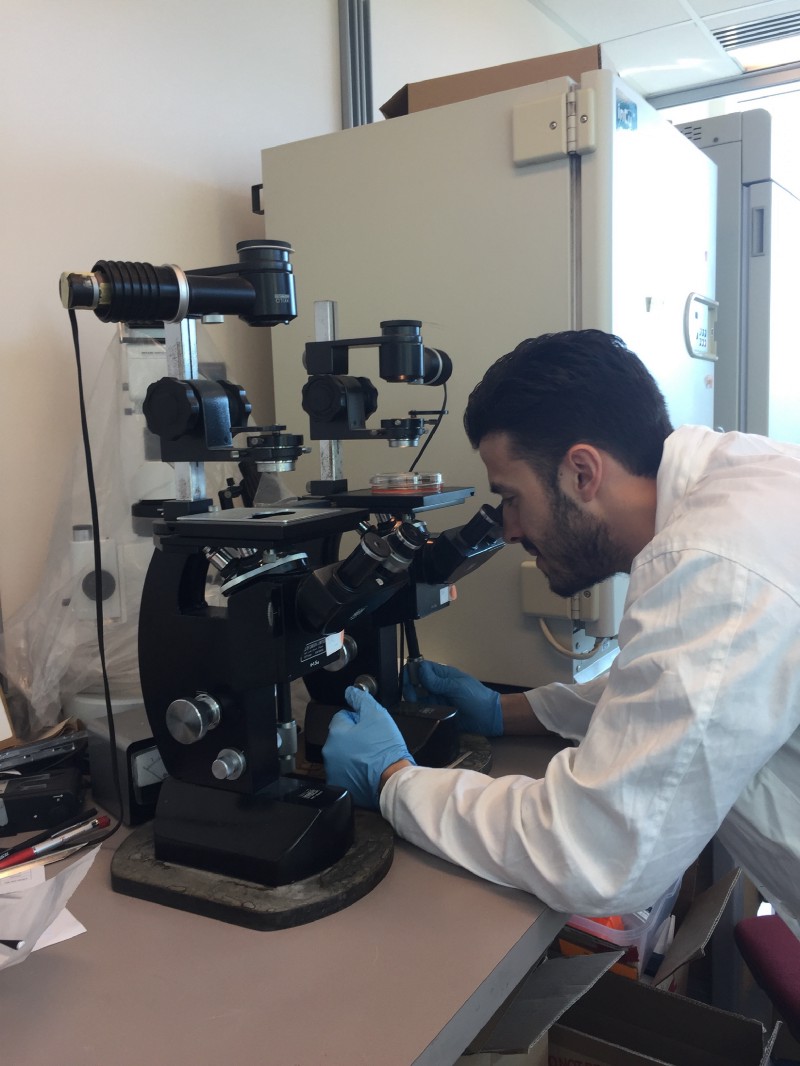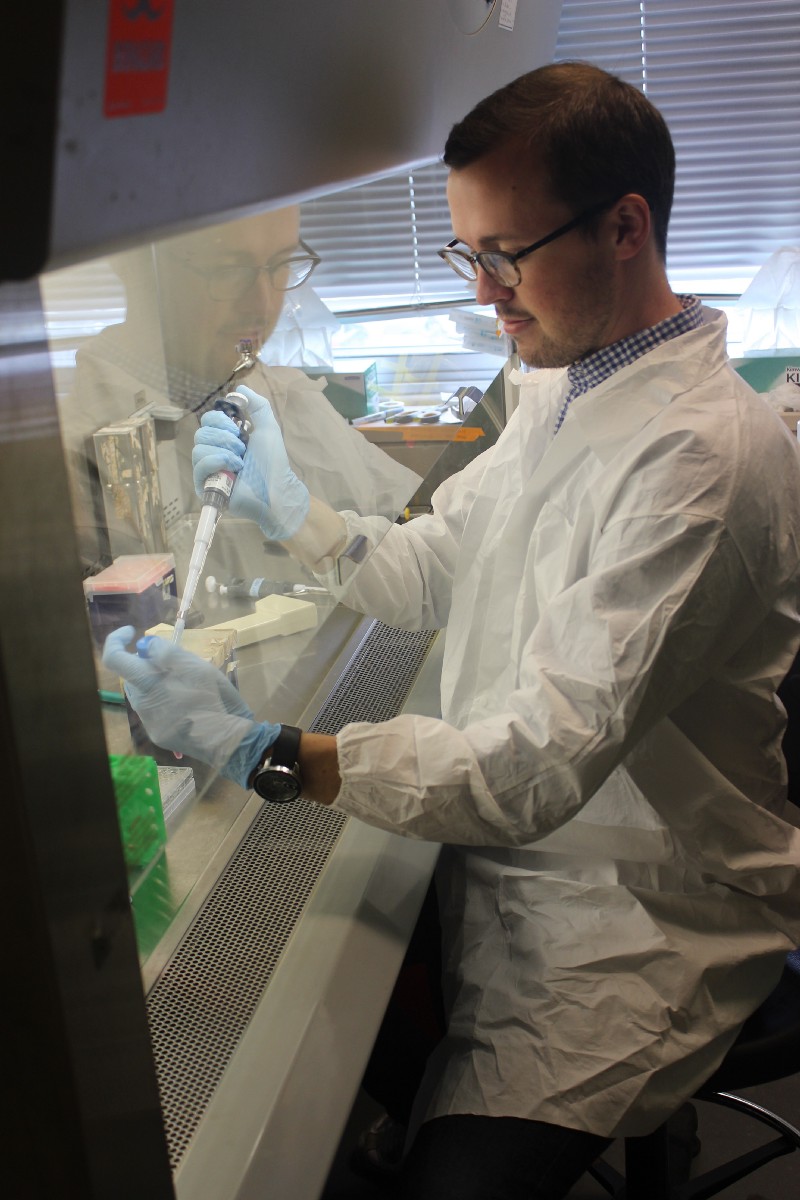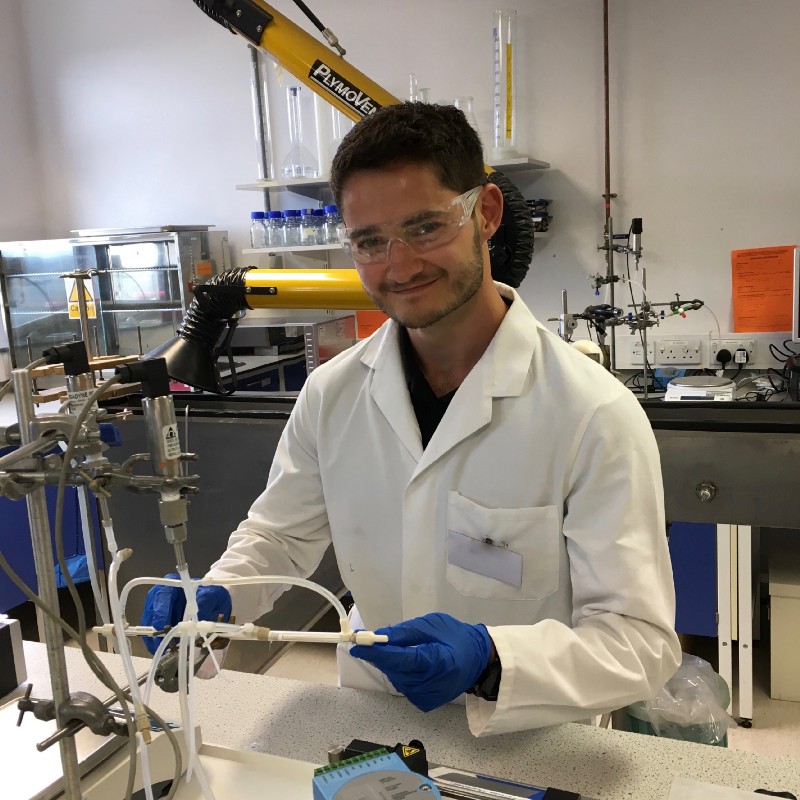With the beginning of the academic year upon us, we’re happy to be onboarding three new research fellows: Santiago Campuzano, at the University of Ottawa, under the supervision of Dr. Andrew Pelling; Andrew Stout, at Tufts University, under the supervision of Dr. David Kaplan; and Scott Allan, at the University of Bath, under the supervision of Dr. Marianne Ellis.
Each new fellow/supervisor team applied with a research proposal that was reviewed internally by New Harvest staff — to ensure it was neglected but crucial research that fit within our current portfolio — then externally by two independent experts each, for scientific merit.
The new fellows will be joining our current cohort, increasing New Harvest’s fellowship community to six full-time cultured meat scientists.
The new fellows will be focused on cells, scaffolds, and bioreactors for the purpose of creating cultured meat. Read on for the details on their projects.

Santiago Campuzano at the microscope
Plant-Derived Scaffolds for Supporting In-Vitro 3D Cell Culture at Small and Large Scales
New Harvest Research Fellow: Santiago Campuzano, BSc Food Science, University of British Columbia
Project Cost: $184,500
Project Start Date: September 1, 2017
Project Duration: Three years full time for a MSc
Supervisors: Dr. Andrew Pelling (Canada Research Chair and Professor, Depts of Physics and Biology; University of Ottawa) & Dr. Charles M. Cuerrier (Postdoctoral fellow, University of Ottawa)
Project Description: Currently, biomaterial scaffolds that support the growth of mammalian cells in 3D are expensive and commonly derived from animal/human products, making them unsuitable for creating cultured meat.
The Pelling lab has demonstrated that apple-derived cellulose can act as an ultra-low cost and efficiently produced scaffold. It could support 3D culture of mammalian cells, promote cell invasion and proliferation, and retain shape and mechanical properties for several months in culture. As an organic, plant-based fibre, cellulose is one of the most abundant, sustainable, and easily sourced biomaterials on earth (it can be found in plant barks and leaves).
Over the following three years, Santiago will be investigating naturally-derived biomaterials from at least five plant sources — asian pear, carrot, rose petals, asparagus, and mushroom, to name a few — as scaffolds for cultured meat production.
Project Relevance: The goal of this work is to develop an open source, plant-based scaffolding platform which can be employed by anyone worldwide for numerous applications, including cellular agriculture.
Fun Facts: Santiago is big into boxing and martial arts, worked in the hospitality industry as a cook and server throughout his degree, and just packed up his car for a 7-day cross-Canada move from Vancouver to Ottawa to begin his research.

Andrew Stout getting started at Tufts
Controlled, switchable differentiation of skeletal muscle in vitro through cell line and matrix engineering
New Harvest Research Fellow: Andrew Stout, BSc Materials Science and Bioengineering, Rice University
Project Cost: $227,264
Project Start Date: September 1, 2017
Project Duration: Four years full time for a PhD in Biomedical Engineering
Supervisors: Dr. David Kaplan (Professor and Chair, Biomedical Engineering; Tufts University)
Project Description:
In essence, cultured meat involves directing tissue engineering towards the large-scale production of animal muscle. There are two phases of growth in cell culture: proliferation and differentiation. Proliferation is where cells increase in number but remain stem-like; differentiation is where cells no longer multiply but mature into muscle fibers.
There are challenges in keeping a cell population multiplying in vitro while also maintaining their ability to differentiate into muscle cells, which affects scalability and end product quality control.
This study aims to understand what scalable factors regulate the myogenic (muscle) pathway, to engineer improved platforms for cultured meat production.
Project Relevance: This research will help us control the production of cultured meat to ensure the growth phase is effective and the differentiation phase is complete.
Fun Facts: Andrew has been part of the cellular agriculture world for a few years! He has interned with Mark Post in Maastricht, the Netherlands twice, as well as with Geltor in San Francisco. Andrew also has an interest in comedy and theatre; he has written 50 original sketches and two short plays.

Scott Allan at Bath University!
Cultured Meat Bioprocess Design
New Harvest Research Fellow: Scott Allan, MEng Chemical Engineering, University of Bath
Project Cost: $95,000
Project Start Date: October 2, 2017
Project Duration: Four years full time for a MRes (Masters of Research) and PhD
Supervisors: Dr. Marianne Ellis (Senior lecturer in Biochemical Engineering; University of Bath), Dr. Paul De Bank (Senior lecturer in Pharmacy & Pharmacology; University of Bath), & Mr. Illtud Dunsford (Farmer, Agri-Food Consultant and owner of Charcutier Ltd)
Project Description: Bioreactor design and control are well established in engineering disciplines like pharmaceuticals and medicine but are completely new for cultured meat. To date, the bioreactors used for cultured meat production have been of a lab scale, typically culture flasks and small scale bioreactors up to 10L. To reach industrial scale production of cultured meat, larger bioreactors must be designed.
Certain parameters must be understood to design an appropriate bioreactor. These fundamental parameters include, but are not limited to:
- reaction kinetics (how quickly muscle cells will grow, divide, and mature),
- transport phenomena (how nutrients will enter the cells, how waste products exit),
- mass transfer limitations (the efficient flow of media over cells)
- metabolic stoichiometric requirements (what the inputs (food) and outputs (waste products) of cultured meat production will be)
This is important research because no such data for muscle cell cultures for meat is currently publicly available.
This project will determine these parameters for cultured meat production, becoming the crucial basis for large scale cultured meat production.
Project Relevance: This research is the necessary first step in scaling cultured meat production. All results will remain open access for use in research and industry.
Fun Facts: Scott is a certified scuba diver, is originally from South Africa, worked as a Distillation Technical Engineer at ExxonMobil, and is in the triathlon and boxing clubs at Bath.
We look forward to sharing their progress on our newsletters, donor updates, and social media channels. Super excited to see these Fellows become an important part of the cellular agriculture community!


